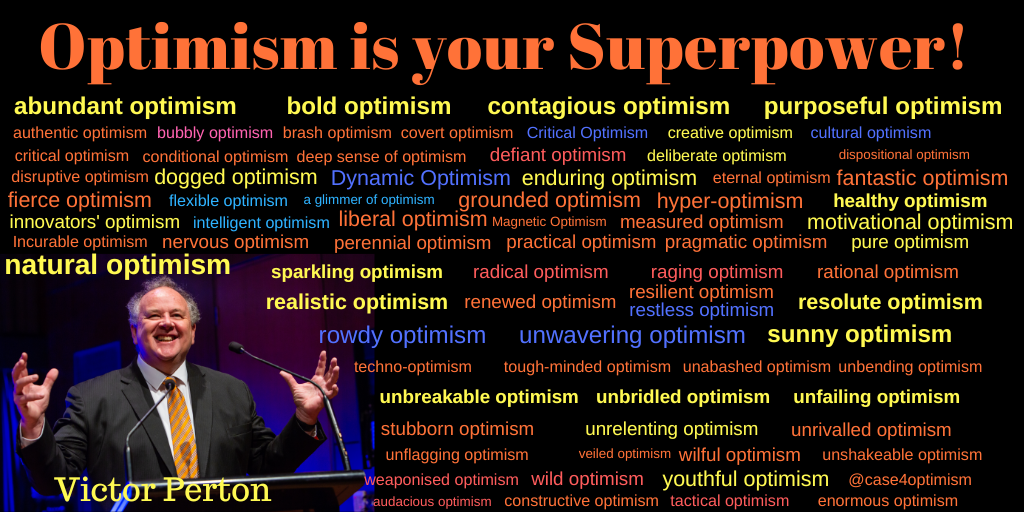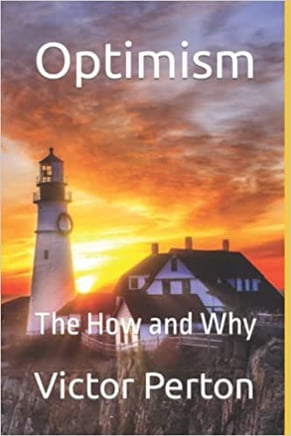The Virtues of Relentless Optimism
By Victor Perton
Relentless optimism embodies the powerful combination of persistence and a positive outlook. It's about persistently maintaining a positive perspective and firm belief in the potential for positive outcomes, even in the face of adversity or uncertainty. The virtues of relentless optimism are profound, impacting health, relationships, productivity, and overall quality of life.
One of the most notable figures embodying this spirit was Nelson Mandela. His relentless optimism and struggle for human rights and freedom are a source of inspiration for all. Yet, regardless of his ordeals, he remained steadfastly optimistic, demonstrating the transformative power of unyielding hope and positive vision to the world.
Relentless optimism also promotes health and longevity. Numerous scientific studies have demonstrated that a positive outlook can lead to better physical health, reduced stress, and longer lifespans. Optimists tend to lead healthier lifestyles, better manage stress, and recover more swiftly from illnesses or surgeries. The relentless pursuit of optimism in moving towards the beacon of hope can be a game-changer.
Mary Eu, author of "StarSilver: Grit and Grace of Older Women," advocates for this relentless optimism as she navigates the journey of aging. She wrote, "As soon as I felt the first stirrings of ageing more than 20 years ago, I prepared myself with an armoury of bold optimism and a gritty dose of humour... I am a relentless optimist disguised as a gentle grandmother of four. My way has always been to move forward rather than dwell on the past or what could have been."
This reflects how optimism not only improves health and longevity but also serves as an effective tool in navigating the various stages of life.
As Professor Erwin Loh, Group Chief Medical Officer at St Vincent's Health Australia, eloquently articulates, "Be an optimist, and be relentless in pursuing the beacon of hope, so that you are always moving towards the light that will guide you, shine on you, and keep the shadows of darkness and despair behind you. You will also make it easier for others to find you, follow you, and be inspired by you. And by moving together in the same positive direction of hope, instead of fear, you can change the world."
Another virtue of relentless optimism is its ability to inspire action. Optimists are proactive. They anticipate positive outcomes, which fuels their determination to take the initiative. They are less likely to be paralyzed by fear of failure, seeing it instead as a learning opportunity. This outlook catalyzes action, making relentless optimists often more productive and innovative in various aspects of life.
Dr Paul Zeitz, Co-Founder of SDG Compacts, offers a powerful testimony to the catalyzing effect of relentless optimism: "An alchemy of clear-eyed optimism mixed with courage is what fuels my drive to pursue justice for all relentlessly, no matter the odds." This attitude, a conscious choice and daily practice, ignites the determination necessary to tackle significant challenges head-on. He further elucidates, "I have to wake up every day and make the choice to be optimistic. When I'm able to be persistently optimistic—this is a daily practice—I'm more able to be committed and courageous to take on the big challenges."
Moreover, relentless optimism fosters a positive environment. Optimistic individuals are like a beacon of hope, influencing and encouraging those around them to stay hopeful and pursue their dreams. This creates a supportive social atmosphere and drives collective action towards shared goals.
Entrepreneurs are a prime example of the power of relentless optimism in action. As Tom Still, president of the Wisconsin Technology Council, once observed: "If you're looking for an oasis of optimism to balance what you're hearing from most economists, talk to an entrepreneur. One survey after another has shown entrepreneurs to be relentlessly optimistic, even Pollyannish, about their chances of success."
In the world of the arts, the virtue of relentless optimism is celebrated. Pollyanna, a character from a book by Eleanor H. Porter and later portrayed in several movies, is known for her relentless optimism despite facing challenges. Katie Knight's critique of "Amélie The Musical" mirrors this sentiment, "At its heart is a story of relentless optimism– and this is portrayed in such a touching, genuine manner, it is sure to stay with its audiences long after." This testament once again showcases relentless optimism's lingering impact and pervasive influence.
The power of relentless optimism is even more profound when applied to individuals recovering from severe traumas, such as brain injuries. In her work with brain injury survivors, Kate Gould underscores the importance of optimism: "I work with adults who have had severe brain injuries through car accidents, workplace injuries, falls, and strokes, and my job is to help them understand how the injuries affected them. I work with them in their home and community to build a meaningful and positive life. So, optimism's absolutely essential in this. Otherwise, why even start if you don't hope things will improve? And so I really believe in relentless optimism, that there's always something that works, and it's our job to figure that out together. What is it that's going to work? Let's try some things out."
Finally, relentless optimism is a key ingredient in the recipe for happiness. Optimists revel in the beauty of the present moment while maintaining an affirmative vision of the future. They savour life's joys, large and small, creating a life filled with happiness and satisfaction.
Despite these virtues, it's crucial to recognize that relentless optimism isn't about denying reality or ignoring the hardships of life. Instead, it is about focusing on the positive, seeking opportunities amidst obstacles, and cultivating a resilient spirit. It is about learning from failures, persisting through difficulties, and believing in the possibility of a brighter future.
In conclusion, the virtues of relentless optimism stretch far beyond the individual, resonating within families, communities, and societies at large. Whether it's the unyielding determination of a figure like Nelson Mandela, the buoyant spirit of an entrepreneur, the hopeful message of a musical, or the therapeutic power of optimism in medical rehabilitation, the impact is profound and far-reaching. As we navigate the complexities and uncertainties of life, embracing relentless optimism can provide us with the strength, courage, and resilience we need to thrive. It can turn setbacks into comebacks, dreams into realities, and the ordinary into the extraordinary. Truly, relentless optimism isn't just a way of thinking; it's a way of living.
Relentless Optimism for People with Brain Injury: Kate Gould in Conversation
"I work with adults who have had severe brain injuries through car accidents, workplace injuries, falls, and strokes, and my job is to help them understand how the injuries affected them. I work with them in their home and community to build a meaningful and positive life. So, optimism's absolutely essential in this. Otherwise, why even start if you don't hope things will improve? And so I really believe in relentless optimism, that there's always something that works, and it's our job to figure that out together. What is it that's going to work? Let's try some things out."
Mary Eu in "StarSilver: Grit and Grace of Older Women"
Mary wrote, "As soon as I felt the first stirrings of ageing more than 20 years ago, I prepared myself with an armoury of bold optimism and a gritty dose of humour. Aye, that’s how I navigate the attrition of ageing and personal awakenings – with a smidge of daring and combativeness..."
"I am a relentless optimist disguised as a gentle grandmother of four. My way has always been to move forward rather than dwell on the past or what could have been."
Tom Still, president of the Wisconsin Technology Council
"If you’re looking for an oasis of optimism to balance what you’re hearing from most economists, talk to an entrepreneur. One survey after another has shown entrepreneurs to be relentlessly optimistic, even Pollyannish, about their chances of success."
(What, me worry? Learning optimism ‘zen’ from entrepreneurs in Milwaukee)
Katie Knight on Amélie The Musical
"At its heart is a story of relentless optimism– and this is portrayed in such a touching, genuine manner, it is sure to stay with its audiences long after."
"Mandela’s relentless optimism and struggle for human rights and freedom are a source of inspiration for all."
Victor Perton
“Do any of these Optimisms describe your Optimism?”
It’s a question we ask in the “What makes you Optimistic?” surveys at The Centre for Optimism. So far, 17% as natural optimists, 15% as resilient optimists, 15% as purposeful optimists, 14% have described themselves as realistic optimists, followed by cautious, relentless and infectious optimists.
Professor Erwin Loh, Group Chief Medical Officer, St Vincent's Health Australia
“Be an optimist, and be relentless in pursuing the beacon of hope, so that you are always moving towards the light that will guide you, shine on you, and keep the shadows of darkness and despair behind you. You will also make it easier for others to find you, follow you, and be inspired by you. And by moving together in the same positive direction of hope, instead of fear, you can change the world.”
Dr Paul Zeitz, Co-Founder of SDG Compacts
“An alchemy of clear-eyed optimism mixed with courage is what fuels my drive to pursue justice for all relentlessly, no matter the odds"
“I have to wake up every day and make the choice to be optimistic. When I’m able to be persistently optimistic—this is a daily practice—I’m more able to be committed and courageous to take on the big challenges.”
Victor Perton
"Pollyanna, a character from a book by Eleanor H. Porter, and later portrayed in several movies, is known for her relentless optimism despite facing challenges."
Sally Branson, Director at The Suite Set
"For me, optimism has been passed down from my grandmother to my mother. My mum is relentlessly positive, and it is a lovely family trait. Is it nature or nurture people ask? I say - Optimism is a habit, a learned behaviour. Optimism is a choice and a daily practice that stems from being grateful."
Framing an Optimistic Australian National Narrative
"McKinsey & Company and Rabobank Australia picked up the same trends for Australia - falling optimism in a country with a stereotype of relentless optimism."
I'd like to tell more positive and optimistic stories: Benjamin Hall
"Benjamin credits a relentless optimism -- and what he describes as an unexplained miracle -- for getting him through."
In his thought-provoking LinkedIn article "Incurable Optimist", Munish Chawla, Co-Founder & Chief Happiness Officer at Jeevitam, explains that an "incurable optimist" is one who relentlessly forges ahead, never letting life's stumbling blocks dampen their belief in a brighter future.
Melanie Hilton
"The thing about Relentless Optimism is you create safe spaces for people to work through their own half-thought opportunities."
Joanne Chan CEO of Turner Duckworth in "Relentless optimism: the one question that always makes work better" (2024)
"Optimism is obviously an abstract and intangible thing, but I’ve seen time and again that it shows in the final deliverable. For me, the best work that anyone can do is that in which the care and love for the process is apparent in the outcome. Ultimately, relentless optimism facilitates the result that every company strives for – a culture and output that makes you, your team, and clients smile – while always aiming for even better."

Read more of these inspiring quotable quotes in "Optimism: The How and Why" by Victor Perton, CEO of The Centre for Optimism.


.svg)
